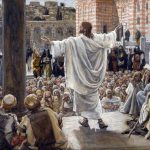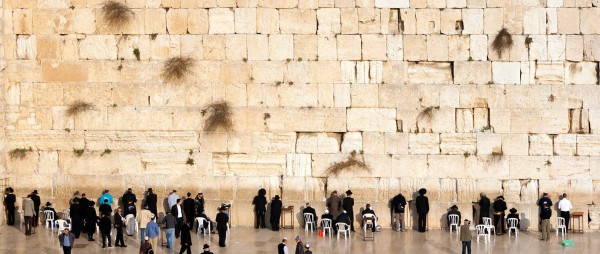
Western (Wailing) Wall in Jerusalem.
“You were shown these things so that you might know that the Lord is God; besides Him there is no other.” (Deuteronomy 4:35)
Do you ever lose your faith in God?
Do you sometimes forget about Him as you get busy with daily life or feel distant from Him and, therefore, give up on praying to Him for others or yourself?
In His word, the Lord commands us not to forget Him or the wonderful deeds He has done for us. (Psalm 103:2)
Beautifully, we find the same cry from the Messiah’s heart before He willingly sacrifices Himself: “Do this in remembrance of Me,” Yeshua (Jesus) says. (Luke 22:19)
Let’s look at why and how we can remember what God has done and is doing in our lives, and how this will help us to overcome the enemy of our souls.

What Has God Done?
Moses told the Jewish people not only to keep God’s commandments but to keep His testimonies.
“You shall diligently keep the commandments of the Lord your God, His testimonies, and His statutes which He has commanded you.” (Deuteronomy 6:17, NKJV)
The Hebrew word for testimony in this verse is aydah (עֵדָה). It is the feminine form of ayd (עֵד), which means witness.
The Hebrew word aydah (עֵדָה) likely derives from the root ood (עוּד), which can mean to admonish or bear witness.
Throughout the Tanakh (Old Testament), the writers of Scripture bore witness to God’s sovereign power, merciful character, and heavenly revelation.
God’s order in the heavens, for instance, is often praised by the psalmists as bearing witness to His glory:
“The heavens are telling (declaring or recounting) of the glory of God; And their expanse is declaring the work of His hands.” (Psalm 19:1; See also Psalm 29)

On earth, God performed so many mighty signs and wonders right in front of the entire nation of Israel. However, He often had to remind them to remember what He did for them. In the wilderness, He told them this:
“Has any other people heard the voice of God speaking out of fire as you have, and lived?
“Has any god ever tried to take for himself one nation out of another nation, by testings, by signs and wonders, by war, by a mighty hand and an outstretched arm, or by great and awesome deeds, like all the things the Lord your God did for you in Egypt before your very eyes?
“You were shown these things so that you might know that the Lord is God; besides him there is no other.” (Deuteronomy 4:33–35)
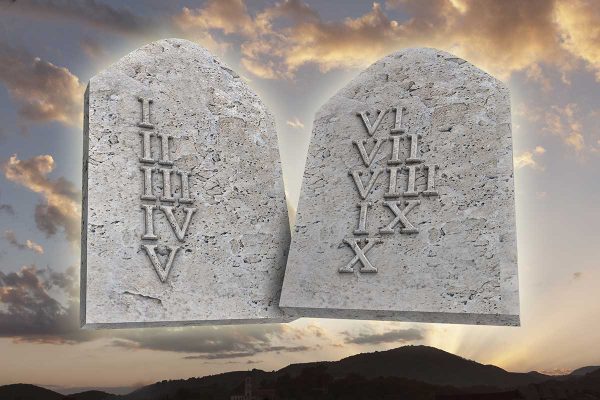
The Ten Commandments, which reveal God’s standards of holiness are sometimes referred to as “His Testimony.” And the Ark that housed them was called “the Ark of His Testimony.” (Exodus 31:7)
Though the Hebrew word aydah primarily refers to testimonies as decrees or statutes of God, the stories in Torah (first five books of the Bible) are essentially testimonies of all God’s miracles from creation to entering the promised Land, of which many were seen by the Israelites.
Consider the manifestations of His glory in your own life.
Has He helped you win a victory or avoid a disaster, heal a wound, helped you financially, or spoken to you in a supernatural way?
God wants you to remember these events as much as He wanted the Israelites to remember what He did for them.
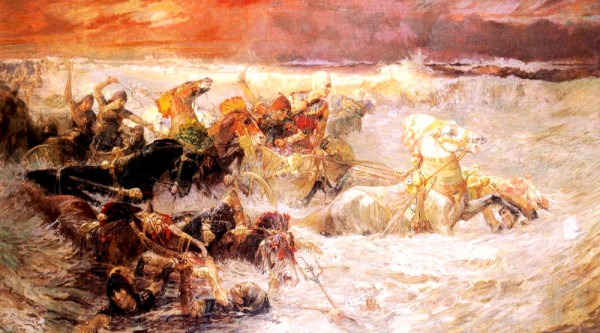
Pharaoh’s Army Engulfed by the Red Sea (1900), by Frederick Arthur Bridgman
How to Remember What God Has Done
God told the Israelites to “keep His testimonies.” (Deuteronomy 6:17)
In Hebrew, the verb keep is shamar (שׁמר), meaning to watch over, preserve, protect or guard.
In Israel today the related term shomer is a security guard. As well, someone who is religious and does not work or drive on Friday night to Saturday night, thereby keeping the Shabbat (Sabbath), is called shomer Shabbat (keeper or guard of the Shabbat).
So in this word shamar, we sense that God’s wonders should be carefully guarded, like treasure.
That entails never forgetting them and not letting future generations forget them either.
God told the Israelites to keep His testimonies in various ways.
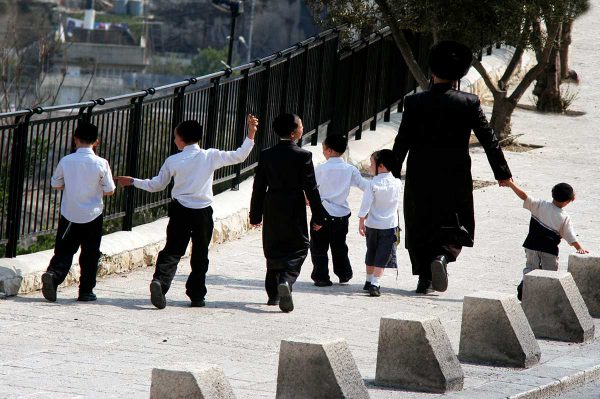
Family of Orthodox Jews walk in Jerusalem.
Tell others, especially the next generation:
God told the Israelites shortly after coming out of Egypt that they had a duty to tell their children all that God had said and done:
“When your son asks you in time to come, saying, ‘What is the meaning of the testimonies, the statutes, and the judgments which the Lord our God has commanded you?’ Then you shall say to your son: ‘We were slaves of Pharaoh in Egypt, and the Lord brought us out of Egypt with a mighty hand; and the Lord showed signs and wonders before our eyes.” (Deuteronomy 6:20–21)
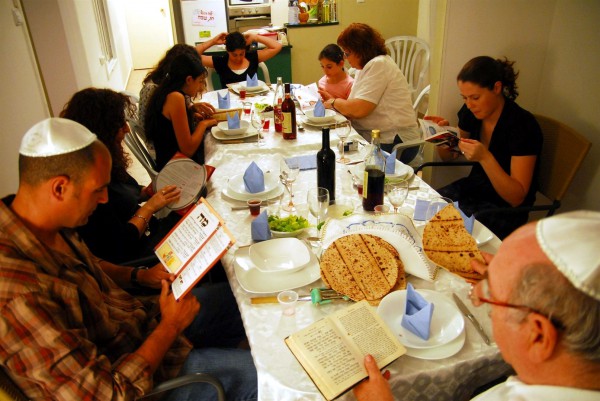
The Passover Seder (retelling the story / testimony about Egypt) is one way God helps the Jewish people remember His testimonies throughout the generations. Each year, at the Passover Seder everyone reads from a book called the Haggadah, which tells God’s great miracles of the plagues and parting the Red Sea. (Exodus 12:24–27)
Place memorial stones that endure over time:
Later, in the Book of Joshua, when the waters of the Jordan river are at flood stage, God miraculously parts the river so that the Israelites can cross over to enter the Promised Land. He then tells them to set up memorial stones of the event!
God appoints twelve men, one from each tribe to take a large stone from where the waters parted and to place them where they camp that night to serve as an enduring memorial for their own generation and future generations:
“In the future, when your children ask you, ‘What do these stones mean?’ tell them that the flow of the Jordan was cut off before the ark of the covenant of the Lord… These stones are to be a memorial to the people of Israel forever.” (Joshua 4:6–7)
As we’ve seen, God is consistently interested in us telling others about what He has done.

What Are Your Memorial Stones?
In our busy lives, we can forget so many things — even these miracles that God has done for us!
But how wonderful that even when we forget about Him, He never forgets us.
“Can a mother forget the baby at her breast and have no compassion on the child she has borne? Though she may forget, I will not forget you!” (Isaiah 49:15; see also Hebrews 6:10)
If only we could remember God the same way He remembers us.
Placing stones where God did a miracle in our lives might not be so practical, but we can journal it by hand or type out the story on our computer, paint-photograph-or draw it, create lyrics for a song, or record it on a voice message app.

We can then share all the testimonies that God has done in our lives with friends, by email, or publicly on social media.
It’s not every day that God does a miracle in our lives, so we need to record His testimonies — they really are about Him — and then reread them either to ourselves or to others every so often.
This is what God told the Prophet Habakkuk to do with the promises He gave him:
Publish it:
“Write down the revelation and make it plain on tablets so that a herald may run with it [some translations say, “publish it”]. For the revelation awaits an appointed time; it speaks of the end and will not prove false. Though it linger, wait for it; it will certainly come and will not delay.” (Habakkuk 2:2–3)

When we are discouraged and struggling to believe that God is on our side, we can pull out that journal we wrote, look at the picture, listen to the testimony we recorded, or sing the song we created, reminding us that “so far the Lord has helped me.”
Those were the words of the Prophet Samuel as he laid a stone of help between the cities of Mizpah and Shen as a memorial for how God helped Israel defeat the Philistines in those cities. (1 Samuel 7:1–12)
In Hebrew, this stone of help is even ezer (אֶבֶן עֵזֶר) or as we say it in English, Ebeneezer, a popular name placed on chapels and other Christian buildings.
Take a moment to think about one of God’s miracles in your life. This would include Him speaking to you, however He did so.
So, what will your “stone of help” be?
As we’ll see next, remembering and telling others about something very special that God has done helps defeat the enemy of our soul.

Throughout Israel today are many memorials, especially Christian churches such as the Church of the Nativity in Bethlehem (above), following from the Biblical practice of setting up ebeneezers to remember and worship the Lord for what He has done.
The Secret Testimony That Overcomes Satan
God has given us the secret for how to overcome Satan’s attempts to break our faith and courage. And it all starts with us forgetting the miracles that God has done in our lives.
But God tells us in advance how to overcome Satan’s strategy.
In the end days, after Satan is hurled to earth in a great heavenly battle, we are told that the brothers and sisters in the body of Messiah will triumph over Satan “by the blood of the Lamb and by the word of their testimony; they did not love their lives so much as to shrink from death.” (Revelation 12:11)
Satan knows that if he can get someone to doubt Yeshua is the Messiah, he will win that soul. This is true because we are also told:
“Whoever believes in the Son of God accepts this testimony … And this is the testimony: God has given us eternal life, and this life is in His Son. Whoever has the Son has life; whoever does not have the Son of God does not have life.” (1 John 5:11–12)
So, these are the secrets to overcoming Satan.
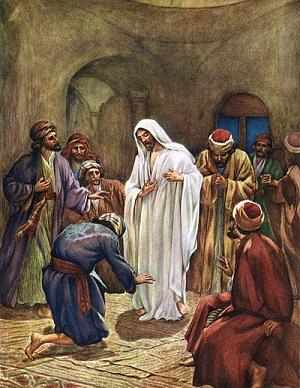
Yeshua Appears to the Disciples after His Resurrection,(1906), by William Hole
First, remember the miracle of Yeshua’s death and resurrection, and tell others about what He has done!
Second, each day ask God to give you a new miracle, and watch what He does!
Then retell the story of what God has done in your life.
He might bring someone to you whom you can help or share the Good News with. He might heal someone that you prayed for. He might supernaturally meet your financial needs and tell you to help someone else. He might speak to you through a vision or dream.
Telling these miracles to others is part of our commission, as Yeshua said to His disciples:
“When the Advocate [Holy Spirit] comes, whom I will send to you from the Father — the Spirit of truth who goes out from the Father — He will testify about Me. And you also must testify, for you have been with Me from the beginning.” (John 15:27)
Personally knowing and encountering Yeshua is not something to keep private. We all must testify about Him through word and deed.
When we tell others, not only do we strengthen our own faith, we plant and water the seeds of faith in others.

The Messianic Prophecy Bible will be a stone of help to the Jewish community, introducing them to the Messianic Prophecies and Yeshua their Messiah





